无灵主语句
- 格式:doc
- 大小:60.50 KB
- 文档页数:9

英语里主语常用人称和非人称两种形式来表达。
用非人称主语表达时,往往注重“什么事发生在什么人身上”。
而汉语则较常用人称主语表达,侧重“什么人怎么样了”。
如1. A terrible thought suddenly struck me—had I locked the door?我突然产生了一个可怕的想法——我锁门了吗?例2.A strange peace came over her when she was alone.她独处时感到一种特别的安宁。
英语中非人称作主语的句子主要有两种类型:a非人称主语句采用“无灵主语”(inanimate subject),表示抽象概念、心理感觉、事物名称或时间地点等,但谓语却常常使用“有灵动词”(animate verb)表示人或社会团体的动作和行为,如:see,desert,find,bring,witness,give,escape,surround,kill,deprive,serve,send,know,tell,permit,invite,take,drive,prevent…from等,这类句子往往带有拟人化(personification)的修辞色彩(如上面两个例句)。
b用非人称代词“it”作主语例如:It never occurred to me that she was so dishonest.译文:我从没有想到她会这样的不诚实。
英语中的这类句子具备着含蓄幽默、生动活泼、客观公正、简洁凝练、句型多样等特点,所以使用广泛。
但是由于汉、英两种语言属于不同的语系,所以在翻译这种无灵主语句时,要考虑到英语的思维方法,然后转换为汉语的思维方法,把句子的内在意义用汉语表达出来。
下面就将非人称(impersonal)主语句英译汉的基本方法略作探讨。
1. 如果主语暗含着条件、因果、时间、地点、方式等意义时,用人作主语,把原来的主语翻译成各种形式的状语。
例如:The forty years, 1840-1880, brought almost ten million migrants to America.译文:从1840至1880这四十年中,近一千万移民移居美国。
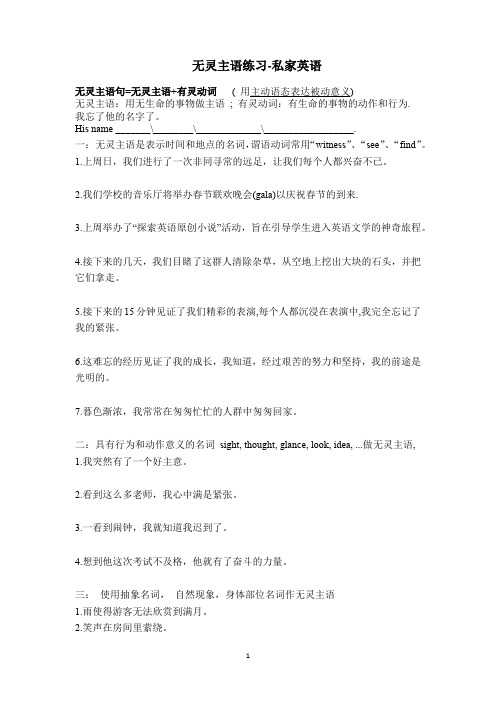
无灵主语练习-私家英语无灵主语句=无灵主语+有灵动词( 用主动语态表达被动意义)无灵主语:用无生命的事物做主语; 有灵动词:有生命的事物的动作和行为.我忘了他的名字了。
His name _______\________\_____________\__________________.一:无灵主语是表示时间和地点的名词,谓语动词常用“witness”、“see”、“find”。
1.上周日,我们进行了一次非同寻常的远足,让我们每个人都兴奋不已。
2.我们学校的音乐厅将举办春节联欢晚会(gala)以庆祝春节的到来.3.上周举办了“探索英语原创小说”活动,旨在引导学生进入英语文学的神奇旅程。
4.接下来的几天,我们目睹了这群人清除杂草,从空地上挖出大块的石头,并把它们拿走。
5.接下来的15分钟见证了我们精彩的表演,每个人都沉浸在表演中,我完全忘记了我的紧张。
6.这难忘的经历见证了我的成长,我知道,经过艰苦的努力和坚持,我的前途是光明的。
7.暮色渐浓,我常常在匆匆忙忙的人群中匆匆回家。
二:具有行为和动作意义的名词sight, thought, glance, look, idea, ...做无灵主语, 1.我突然有了一个好主意。
2.看到这么多老师,我心中满是紧张。
3.一看到闹钟,我就知道我迟到了。
4.想到他这次考试不及格,他就有了奋斗的力量。
三:使用抽象名词,自然现象,身体部位名词作无灵主语1.雨使得游客无法欣赏到满月。
2.笑声在房间里萦绕。
3.低云裹住山腰4.夜幕降临,黑暗笼罩着森林。
5.当她看到熟悉的字迹时,便热泪盈眶。
6.她一个人的时候,她总感觉有一种奇怪的平静. come over(感情)掌握住某人7.微风轻柔地亲吻着她的脸庞8.我会永远记住这次经历\教训。
9.深深的皱眉渐渐爬上我的脸.10.当我最终在所有观众面前展示自己时,语言无法表达我的兴奋和欣喜四:情感类名词或心理活动名词作无灵主语1.想到考试的失败,我很失望。

Terry’s tip: Only the grasp of some sentence structures typical in English can give you a glance of what English thinking really is, and once you have a good command of that, you’ll be more native-like.英语中的无灵主语句无灵主语句是英语思维不同于汉语思维的典型体现,只有悟性超群的学生才能窥见此中真谛。
一、常见的无灵主语句:客观事物“看”得见(see, find, witness)①The new century will see a significant and far-reaching change in China.中国在新世纪将发生重大而深远的变化。
②Tianjin first saw the rise of the May Fourth Movement.“五四运动”最早从天津开始。
③Youth sees him on a job and in love.进入青春期,他工作了,他恋爱了。
④The world history has seen more tears than laughter.在世界历史上泪水比欢笑多。
⑤September finds agreeable weather in Shanghai.九月的上海天气宜人。
⑥The year 2003 witnessed an unprecedented disastrous flood in Huai river basin.2003年淮河流域发生了史无前例的洪灾。
二、常见无灵主语句:生动地道的表达①你为什么会问这个问题?What makes you ask this question?②我突然有了一个好主意!A bright idea flashed/jumped into my mind!③我一时想不起他的名字来了。
![无灵主语句[整理版]](https://img.taocdn.com/s1/m/4771b952f08583d049649b6648d7c1c708a10bd8.png)
英语无灵主语句一.主语是情感状态的抽象名词谓语选择如:creep, strike, seize, dawn, catch, worm into, grip, enter, register, overcome, take possession of, surround, give way to, desert, pass, tear 等词。
1. Fear gripped the village. 整个村庄笼罩在恐怖之中。
2. Courage deserted him. 他没有了勇气。
3. His presence of mind deserted him. 他失去了沉着。
4. The earthquake struck the village two minutes ago.5. A new dignity crept into his steps. 他走起路来,不知不觉添了几分尊严。
6. Anxiety tore him into pieces. 他焦虑万分,肝肠寸断。
7. By now optimism had given way to doubt. 现在,乐观变成了怀疑。
8. Anger choked my words. 我气的说不出话。
9. Astonishment deprived me of my power of speech. 我惊讶得说不出话来。
10. Neither sorrow nor regret followed my passionate outburst.我这样发作一通之后,既不难过,也不后悔。
11. A chill of horror suddenly swept over him. 他突然感到不寒而栗。
12. Despair seized him at the thought of her setting out alone to renew theweary quest for work.想起她一个人出去重新登上找工作的艰辛路途,他觉得万念俱灰。


汉语无灵主语句的理解及其英译
汉语无灵主语句是指没有主干动词做主语的句子,没有明确表示出句子主语时,句子主干和句子其他成分有某种关系才能让句子表达意思,故被称为无灵主语句。
无灵主语句可以分为两类:实语无灵主语句和状语无灵主语句。
实语无灵主语句是指在句子中没有主语出现,但宾语是句子的主干,可以将句子的表达意思联系起来的句子。
例如“冬天,穿棉袄”。
在此句中,穿棉袄是句子的主体,宾语,也是动词穿的宾语,因此可以把“穿棉袄”作为句子的主干,用来表达句子的主语,这样就可以把这句话称为实语无灵主语句。
状语无灵主语句是指在句子中没有主语出现,但是状语是句子的主干,可以将句子的表达意思联系起来的句子。
例如“晴天,一起去游泳”,这句话中,晴天是句子的状语,可以将句子的表达意思联系起来,这样就可以把这句话称为状语无灵主语句。
English Translation:
Chinese non-subjective sentences, are sentences without a main verb subject, when there is no clear indication of the subject in the sentence, the main clause and other components must form a certain relationship in order for the sentence to make sense, and thus, it is known as a non-subjective sentence.。

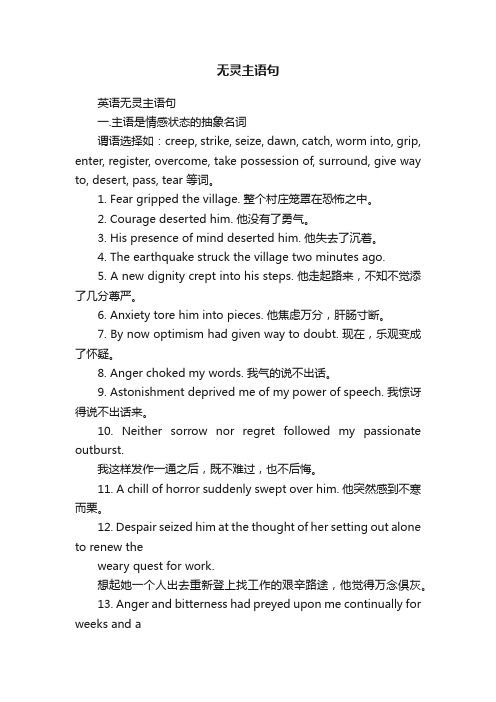
无灵主语句英语无灵主语句一.主语是情感状态的抽象名词谓语选择如:creep, strike, seize, dawn, catch, worm into, grip, enter, register, overcome, take possession of, surround, give way to, desert, pass, tear 等词。
1. Fear gripped the village. 整个村庄笼罩在恐怖之中。
2. Courage deserted him. 他没有了勇气。
3. His presence of mind deserted him. 他失去了沉着。
4. The earthquake struck the village two minutes ago.5. A new dignity crept into his steps. 他走起路来,不知不觉添了几分尊严。
6. Anxiety tore him into pieces. 他焦虑万分,肝肠寸断。
7. By now optimism had given way to doubt. 现在,乐观变成了怀疑。
8. Anger choked my words. 我气的说不出话。
9. Astonishment deprived me of my power of speech. 我惊讶得说不出话来。
10. Neither sorrow nor regret followed my passionate outburst.我这样发作一通之后,既不难过,也不后悔。
11. A chill of horror suddenly swept over him. 他突然感到不寒而栗。
12. Despair seized him at the thought of her setting out alone to renew theweary quest for work.想起她一个人出去重新登上找工作的艰辛路途,他觉得万念俱灰。
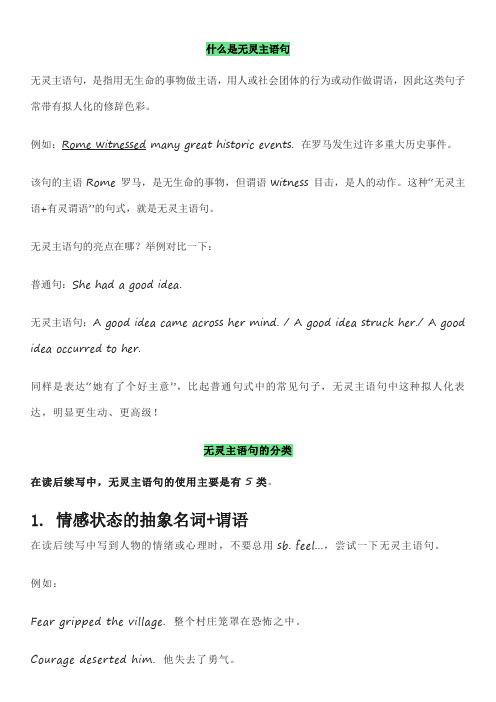
什么是无灵主语句无灵主语句,是指用无生命的事物做主语,用人或社会团体的行为或动作做谓语,因此这类句子常带有拟人化的修辞色彩。
该句的主语Rome罗马,是无生命的事物,但谓语witness目击,是人的动作。
这种“无灵主语+有灵谓语”的句式,就是无灵主语句。
无灵主语句的亮点在哪?举例对比一下:普通句:She had a good idea.无灵主语句:A good idea came across her mind. / A good idea struck her./ A good idea occurred to her.同样是表达“她有了个好主意”,比起普通句式中的常见句子,无灵主语句中这种拟人化表达,明显更生动、更高级!无灵主语句的分类在读后续写中,无灵主语句的使用主要是有5类。
1. 情感状态的抽象名词+谓语在读后续写中写到人物的情绪或心理时,不要总用sb. feel...,尝试一下无灵主语句。
例如:Fear gripped the village. 整个村庄笼罩在恐怖之中。
Courage deserted him. 他失去了勇气。
Anger choked my words. 我气得说不出话。
A wave of nervousness washed over him. 一阵紧张的情绪涌上他的心头。
A chill of horror suddenly swept over him. 他突然感到不寒而栗。
Excitement seized him. 他好兴奋。
这种拟人化的描写,将情绪生动地表达出来,在考试中绝对加分!补充一些相关常见词汇,大家续写时,可以根据文中的情绪,挑选恰当的词自行搭配。
常见的情绪名词:happiness, joy, delight 开心快乐surprise, astonishment 惊奇,惊讶shame 羞耻,羞愧anger 愤怒despair 绝望regret 遗憾,后悔sorrow 悲伤horror 惊恐anxiety 焦虑disappointment 失望,沮丧satisfaction 满意,满足puzzlement 困惑不解常见的谓语动词:seize 侵袭choke 噎住,堵住flood 充满creep 不知不觉产生grip 紧抓give way to 被……代替wash over 洗涤,侵袭deserted 丢弃,遗弃2. 思考/动作行为的名词+谓语在读后续写中描写人物动作或思考行为时,也可以使用无灵主语句。

无灵主语什么是无灵主语句呢?即没有生命的事物来做主语的句子,因此这类句子常常带有拟人化的修辞色彩。
比如,”北京见证了数不清的历史事件。
”无灵主语句在读后续写中非常地常见,正确而又恰当地使用它,可以让句子的描写更加生动。
运用“无灵”主语句,能突出人物的心理情感,使续写语言更加生动形象、栩栩如生➢下面我将从五个方面阐明它的运用。
■句式1在读后续写中写到人物的情绪或心理时,不要总用sb feel...,尝试一下无灵主语句,可以让阅卷老师读起来更有画面感。
(a burst/wave/surge/rush/ripple/sense/feeling of+)表情感状态的名词十有灵动词十sb.表“某人感到…”或“一阵/一种……向某入袭来”常见的情感名词有:开心:happiness/joy/delight 愤怒:anger/rage/fury/irritation 悲伤:sadness/ sorrow/grief 感激:appreciation/gratitude 钦佩/赞赏:admiration/appreciation 悔恨/愧疚:remorse/guilt/shame 害怕:fear/terror/fright/horror/panic 震惊: astonishment/shock/amazement/surprise 满足:satisfaction 困惑:puzzlement/confusion用于该句式的有灵动词(短语)有:seize/take hold of “抓住;攫住”;get the better of/defeat“击垮”;sweep/flood/rush over“袭来”;creep upon “慢慢产生” ;come over “影响” ; run through/pass through “掠过” ;swallow“吞噬;淹没”;choke “使哽咽” ;tear...into pieces “把……撕碎” ;fail“使失望;有负于”等。

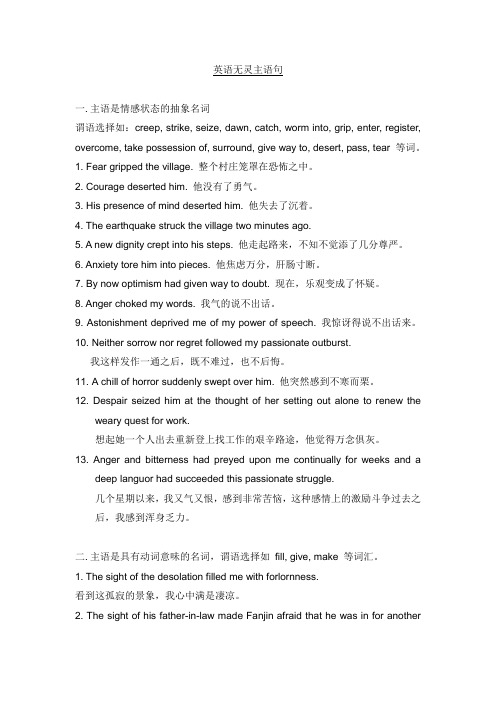
英语无灵主语句一.主语是情感状态的抽象名词谓语选择如:creep, strike, seize, dawn, catch, worm into, grip, enter, register, overcome, take possession of, surround, give way to, desert, pass, tear 等词。
1. Fear gripped the village. 整个村庄笼罩在恐怖之中。
2. Courage deserted him. 他没有了勇气。
3. His presence of mind deserted him. 他失去了沉着。
4. The earthquake struck the village two minutes ago.5. A new dignity crept into his steps. 他走起路来,不知不觉添了几分尊严。
6. Anxiety tore him into pieces. 他焦虑万分,肝肠寸断。
7. By now optimism had given way to doubt. 现在,乐观变成了怀疑。
8. Anger choked my words. 我气的说不出话。
9. Astonishment deprived me of my power of speech. 我惊讶得说不出话来。
10. Neither sorrow nor regret followed my passionate outburst.我这样发作一通之后,既不难过,也不后悔。
11. A chill of horror suddenly swept over him. 他突然感到不寒而栗。
12. Despair seized him at the thought of her setting out alone to renew theweary quest for work.想起她一个人出去重新登上找工作的艰辛路途,他觉得万念俱灰。
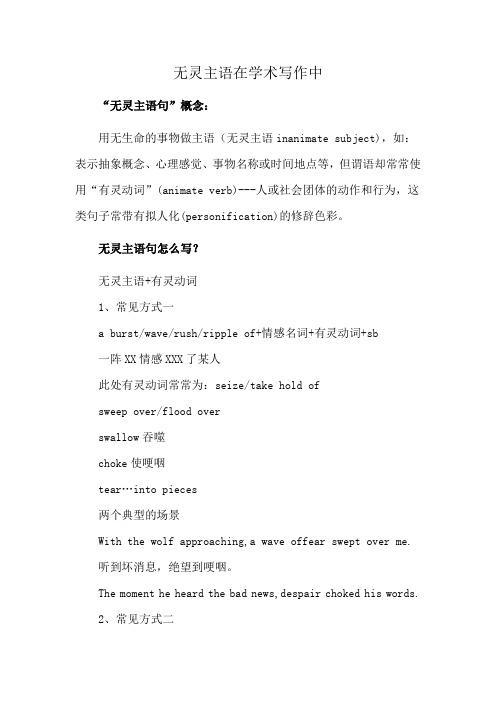
无灵主语在学术写作中“无灵主语句”概念:用无生命的事物做主语(无灵主语inanimate subject),如:表示抽象概念、心理感觉、事物名称或时间地点等,但谓语却常常使用“有灵动词”(animate verb)---人或社会团体的动作和行为,这类句子常带有拟人化(personification)的修辞色彩。
无灵主语句怎么写?无灵主语+有灵动词1、常见方式一a burst/wave/rush/ripple of+情感名词+有灵动词+sb一阵XX情感XXX了某人此处有灵动词常常为:seize/take hold ofsweep over/flood overswallow吞噬choke使哽咽tear…into pieces两个典型的场景With the wolf approaching,a wave offear swept over me.听到坏消息,绝望到哽咽。
The moment he heard the bad news,despair choked his words.2、常见方式二用tears,smile等做主语看到XX,热泪盈眶/灿烂笑容At the sight of,tears welled up in hereyes.At the sight of,a wide smile appearedon his face.当他…的时候,眼泪哗哗往下流。
When he,tears streamed down hischeeks3、常见方式三时间或地点做主语,动词用see、witness一类表示“见证”The past three years has seen/witnessed an increase in public awareness of self-protection.The speech at the graduation ceremoney saw his progress and growth.说在最后:很多中国学生不习惯使用无灵主语,这是因为汉语中多用人称做主语,侧重表达“人做事”。
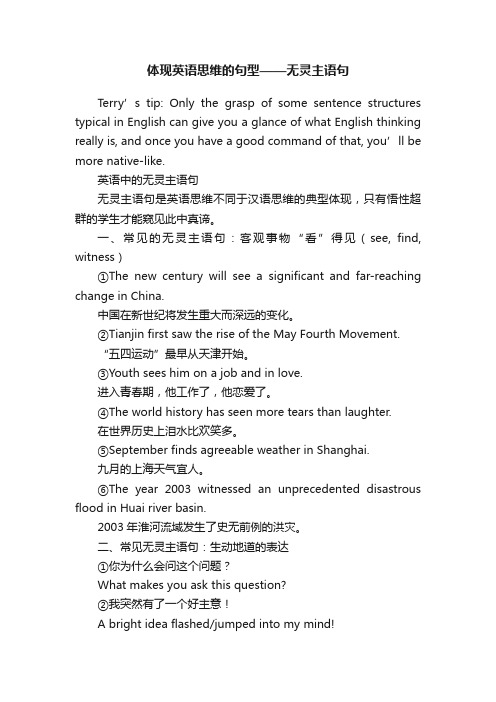
体现英语思维的句型——无灵主语句Terry’s tip: Only the grasp of some sentence structures typical in English can give you a glance of what English thinking really is, and once you have a good command of that, you’ll be more native-like.英语中的无灵主语句无灵主语句是英语思维不同于汉语思维的典型体现,只有悟性超群的学生才能窥见此中真谛。
一、常见的无灵主语句:客观事物“看”得见(see, find, witness)①The new century will see a significant and far-reaching change in China.中国在新世纪将发生重大而深远的变化。
②Tianjin first saw the rise of the May Fourth Movement.“五四运动”最早从天津开始。
③Youth sees him on a job and in love.进入青春期,他工作了,他恋爱了。
④The world history has seen more tears than laughter.在世界历史上泪水比欢笑多。
⑤September finds agreeable weather in Shanghai.九月的上海天气宜人。
⑥The year 2003 witnessed an unpreceden ted disastrous flood in Huai river basin.2003年淮河流域发生了史无前例的洪灾。
二、常见无灵主语句:生动地道的表达①你为什么会问这个问题?What makes you ask this question?②我突然有了一个好主意!A bright idea flashed/jumped into my mind!③我一时想不起他的名字来了。
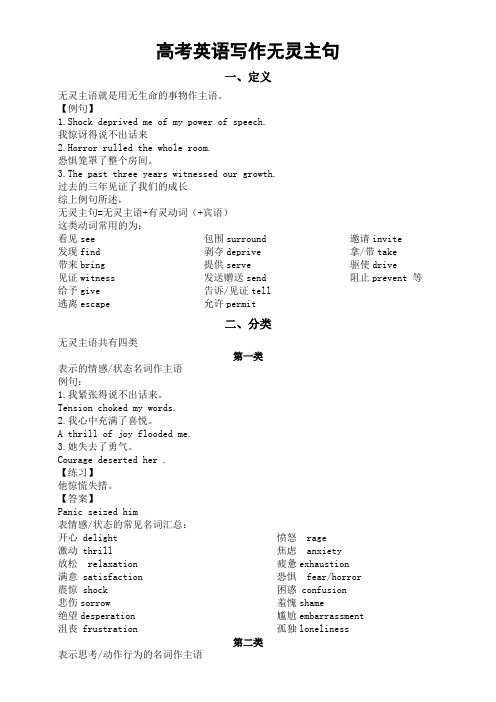
高考英语写作无灵主句一、定义无灵主语就是用无生命的事物作主语。
【例句】1.Shock deprived me of my power of speech.我惊讶得说不出话来2.Horror rulled the whole room.恐惧笼罩了整个房间。
3.The past three years witnessed our growth.过去的三年见证了我们的成长综上例句所述,无灵主句=无灵主语+有灵动词(+宾语)这类动词常用的为:看见see 发现find带来bring见证witness 给予give逃离escape 包围surround剥夺deprive提供serve发送赠送send告诉/见证tell允许permit邀请invite拿/带take驱使drive阻止prevent 等二、分类无灵主语共有四类第一类表示的情感/状态名词作主语例句:1.我紧张得说不出话来。
Tension choked my words.2.我心中充满了喜悦。
A thrill of joy flooded me.3.她失去了勇气。
Courage deserted her .【练习】他惊慌失措。
【答案】Panic seized him表情感/状态的常见名词汇总:开心 delight 激动 thrill放松 relaxation 满意 satisfaction震惊 shock 悲伤sorrow绝望desperation沮丧 frustration愤怒 rage焦虑 anxiety疲惫exhaustion恐惧 fear/horror困惑 confusion羞愧shame尴尬embarrassment孤独loneliness第二类表示思考/动作行为的名词作主语例句:我脑子里闪过一个可怕的念头An awful thought struck me.我们爬了50分钟到了山顶。
A 50 minutes' climbing brought us to the top of the mountain. 【练习】看到这个情景使我心中充满了幸福。


读后续写之无灵主语无灵主语句=无灵主语+有灵动词“无灵主语”简单理解就是“没有生命力”的东西做主语。
比如时间,地点,自然现象等。
“有灵动词”简单理解就是把没有生命力的东西,赋予有生命力的动作。
比如I love everybody.译为:我爱大家,→My love goes to everybody.中love就是没有生命力的名词,但是go就是有生命力的动词。
(1)第1个优点:增加主语的多样性。
往往在写作时,我们会反复用同一有生命的词作主语,使语句显得单调,重复。
这些总在不经意之间常常发生。
例如We don’t think so.If we want light,we mustconquer darkness.我们并不这么认为。
如果我们想要光明,我们就必须征服黑暗。
三个we的使用,使句子显得平淡,甚至别扭,但如果稍加变动,句子会显得协调的多。
We don’t think so.If we want light,darkness must be conquered.我们并不这么认为。
如果我们想要光明,黑暗就必须被征服。
(2)第2个优点:增使语言更生动化。
将无生命的事物作主语而展开的句子,往往会用上比喻、拟人等修辞手法,语言随之提升一个档次。
这也就是无灵主语的难点所在,也是华丽之处。
需要注意的是,并不是简单的主动语态变为被动语态,而是用主动语态去表达被动意义。
比如:I forgot his name.我们忘了他的名字了。
并不是简单地变为His name was forgotten by me.而应当更为形象的用主动语态表示。
比如我们可以说:“他的名字溜出了我的大脑。
”His name slipped my mind.“他的名字没有在我头脑中扎根。
”His name didn't take root in my mind.其实要写这样的句子并不难,只要掌握这种思想,加上一段时间的练习,肯定会下笔如有神。
英语无灵主语句语料库ⅰ主语是某种心理感受,谓语选择creep, strike, seize, dawn, catch, worm into, grip, enter, register, overcome, take possession of, surround, give way to, desert, pass, tear等词。
Fear gripped the village. 整个村庄笼罩在恐怖之中Courage deserted him.他没有了勇气。
His presence of mind deserted him.他失去了沉着。
The earthquake struck the village two minutes ago.It dawns on me that *** 开始明白A new dignity crept into his steps.他走起路来,又不知不觉新添了几分尊严。
My perception for free-loaders----welfare and food stamp recipients----had always been tinged with disdain. 过去,我一向都用轻蔑的眼光看待那些揩油的人——福利金和食品券的领取者。
His action was prompted by the fear of being attacked. 怕遭到攻击,他采取了行动。
Anxiety tore him into pieces. 他焦虑万分,肝肠寸断。
By now optimism had given way to doubt. 现在,乐观变成了怀疑。
Anger choked my words.我气的说不出话。
ⅱ主语选择心理动作,谓语选择fill, give, make等“使…心理变化”的词汇。
The sight of the desolation filled me with forlornness. 看到着孤寂的景象,我心中满是凄凉。
The sight of his father-in-law made Fanjin afraid that he was in for another cursing. 见丈人在眼前,恐怕又要挨骂。
Only the thought of his mother gave him the strength to go on doing it. 只有想到母亲,他才有力量继续工作。
ⅲ主语的内容为心理对象,谓语选择slip, lend, elude, escape, stump等词汇,宾语是逻辑施事。
His name escaped me at the moment. 我想不起他的名字。
His name escaped/evades/fails me at the moment.当时我没有记起他的名字。
The question eludes/stumps me. 这个问题把我难住了。
The mistake slips my attention.我没有注意到这一错误。
His hint escaped me.我没有注意到他的暗示。
The sentence eludes me.我理解不了这个句子。
ⅳ主语是行为动作的施予对象,谓语表示“容许”、“给予”、“引起”,选用deny, ask, admit, allow, fail, pass等词,宾语是施予的内容。
The scenery baffles/denies description.风景美得难以描述。
Such a chance denied me. 我没有得到这样一个机会。
The matter asks immediate attention. 这件事需要立即处理。
The exigencies of the matter admitted no alternative.此事紧急,别无他法。
Space does not allow us to further analyze this problem here.Reproach spared him not, even in his grave.即便是在他死后,人们也一直在谴责他。
Time fails me to finish the topic.我没有时间把这一话题说完。
The title of the book invites/spells/incenses the readers’ interest. The title of the book catches our attention.ⅴ名词或名词化结构表示原因、方式、目标,谓语动词使用“使……产生变化”的词汇。
①使失去(deprive, cost, rob, bereave, disarm, prevent, diminish);使增加(add, embolden, brighten, win);使无能(disable, incapacitate, disqualify);使赋能(enable, empower, qualify);使免除(save, exonerate);Two bowls of wine bolstered up his courage, making him lose his scruples and start his usual rampaging. 屠户被众人局不过,只得连斟两碗喝了,壮一壮胆,将平日的凶恶样子拿出来。
Sickness robbed him of confidence.His weariness and the increasing heat determined him to sit down the earliest shade.My capacity for hard word saved me from early dismissal.我要不是能干重活,早就被解雇了。
His embezzlement leads to his imprisonment.His acceptance of briberies resulted in his imprisonment.His criminal record disqualified him from the admission of college.Astonishment deprived me of my speech. (Astonishment made me speechless.)The discovery of a knife in his possession lends to all a suspension of his being the murder.Poor weather prevented us from going there.Poor health incapacitated (disabled) him from realizing his dream. His melancholy end disarms censure of its asperity. 他的悲惨结局使人们在指责他的时候都不愿意那么苛刻。
A bold stroke would free the land from rapine devastation and brutal outrage.只要打一个漂亮仗,就能使国土免遭破坏和野蛮的蹂躏。
His addition completed the list. 把他添上以后,名单就完备了。
His adventurous exploits soon won him notoriety. 他作战勇敢,屡建战功,很快就声名远扬。
Successive exertion chipped a few pounds off him.他工作一直太尽力,瘦了好几磅。
The application of electronic computers makes for a tremendous rise in labor productivity.由于使用电脑,生产率大大提高了。
A garden brightens his life.②使保持状态(keep, make, hold)The old and dilapidated house in the deserted lane made a dismal picture. 房子位于荒废的小巷里,破败陈旧,一片凄凉。
Loneliness held the immigrants together and poverty kept them down.孤寂使得移民们聚集在一起,但贫困却使他们情况每况愈下。
The want of his family had kept him from school, and he seemed to feel the loss. 他因家庭贫困而辍学,他似乎也感觉到这一损失了。
③过程、状态变化类动词(throw, get, bring, temper, show, send)The laconic nature of Washington’s note to Conway had thrown them all in confusion. 华盛顿给康威的短信,言简意赅,使他们陷入一片慌乱之中。
An early start will get you there at noon.A careful comparison will show there is no resemblance between the two in nature.仔细比较一下就会发现两者在本质上没有相似之处。
A few steps across the lawn brought me to a large , splendid hotel.沿着草地走上几步,我就来到一个豪华的大宾馆前。
A savage recession has sent Britain’s unemployment to 2 million workers.ⅵ将时间、处所作为主语,谓语动词用“看见”、“听见”、“使……产生变化”之类词汇。
Ten days would disband his corps and leave him 1400 men. 十天以后,他的军队就会土崩瓦解,他也就只剩下1400人了。
The forty years, 1840-80, brought almost ten million migrants toAmerica.That chilly afternoon witnessed him trudging in the snow.Thus the gathering dark often finds me hastening home in a hurrying crowd. Whether it rains or snows, windy or foggy, it is the longing to be home that quickens my steps.Dusk found the child crying in the street.Liberation found my hometown with few hospitals.Dawn found him well along the road. 东方破晓的时候,他早已经上路了。